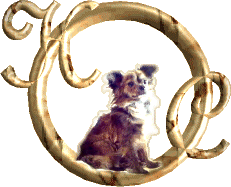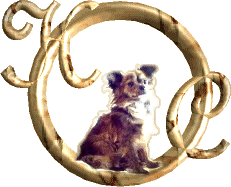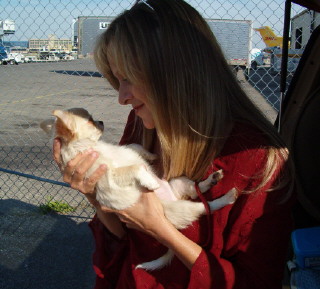 |





HAYES CHIHUAHUAS IS NOW LOCATED IN OHIO
About Me!!




My arrival from Chistoso's (FINLAND)
" I love my Chihuahuas, with all my heart and soul!!!"
These are not just my pets... they are my life!
Nothing can make a heart smile brighter than a sweet puppy kiss or
a tail wagging when you come home!
|
A long time ago, I was given the most beautiful long coated Chihuahua
by my Brother. Her name was Chi-Chi. Her hair was so silky and shiny. The color of red. When the sun glissened on her with those deep brown eyes and wagging tail, you couldn't help but smile. She was given to me at a time in my life when I needed it most. Chi-Chi went everywhere with me and every morning, she would sit on my lap as I enjoyed my morning cup of coffee. No matter what I did throughout my day, Chi-Chi was always by my side. One day, my daughter took her outside to play. The telephone had rang and my daughter ran inside to answer it. She called Chi-Chi to follow her in... but the door closed to fast. My daughter answered the telephone and then ran back outside as she had noticed that Chi-Chi wasn't there beside her waiting to go back outside to play. My daughter called to me and made me aware that Chi-Chi wasn't in the yard. It sounded so strange as she never left the yard before as well, she was never left unattended. I ran outside in just a frannic, yelling for my precious Chi-Chi with such a fear over me. Just then, a lady came walking towards me, holding my Chi-Chi. At first,(though I didn't say) my first thought was, how dare that lady touch my dog! And then, with a puzzeled look on my face, she said to me......."She's gone!" What! I dropped to the ground. I can't explain all of the pain I went through. I couldn't stop crying. It was if I lost a child. The next day, Chi-Chi was not there for my morning coffee. She didn't follow me around. There was no wagging tail, no happy smiles of love. There was nothing but emptyness. I could barely breath! I decided that people need to know the love that I had in my Chihuahua. That they aren't this barking little voice box. That Chihuahuas are an unbelieveable dog breed that are so devoted to making you so happy in your live. That all they want is to be and give love! From that point on, I started studing all and everything I could get my hands on about Chihuahuas. I read so many books, studied genitic's, I researched all of the positive as well as negitive's, talked to breeder's and show people, as well as vets. I put everything I had into learning everything I could about the breed. And then, I started..... It has been several years since all of this. But all I can say is... Chi-Chi, I shall ALWAYS love you with all of my heart and soul and I can't wait until we meet again, and I get to hold you once more in my loving arms!
FOR THERE IS NOTHING LIKE A CHIHUAHUA!!!
 |
I WISH YOU ENOUGH!
I wish you enough sun to keep your attitude bright.
I wish you enough rain to appreciate the sun more.
I wish you enough happiness to keep your spirit alive.
I wish you enough pain so that the smallest joys in life appear much bigger.
I wish you enough gain to satisfy your wanting.
I wish you enough loss to appreciate all that you possess.
I wish you enough "Hello's" to get you through the final "Good-bye."
I WISH YOU ENOUGH!
Grieving!
For all that have deeply loved,
and lost one of the most precious parts of your life.
I hope this will help!
Laurie Hayes
Hayes Chihuahuas
How can I face the loss?
After your pet has died, it is natural and normal to feel grief and sorrow.
The forgiving process includes accepting the reality of you loss,
accepting that the loss and accompanying feelings are painful,
and adjusting to your new life that no longer includes your pet.
There are many signs of grief, but not everyone experiences them all,
or in the same order.
Even before death has occurred, you reaction may be to deny your pet is sick
or injured when you learn the extent of your pet's illness or injuries.
Anger may follow denial.
This anger can be directed toward people you normally love and respect,
including your family and veterinarian.
People will often say things that they do not really mean,
perhaps hurting those whom they do not mean to hurt.
You may blame yourself or others for not recognizing the illness earlier
or for being careless and allowing the pet to be injured.
You also may feel guilt and depression.
This is when you usually feel the greatest sense of loss.
The tears flow, there are knots in you stomach,
and you are drained of all your energy. Day-to-day tasks can seem impossible.
Sometimes you may even ask yourself if you can go on without your pet.
The answer is yes, but there are times when special assistance may be helpful.
Once you and your family come to terms with your feelings,
you can begin to resolve and accept your pet's death.
When you have reached resolution and acceptance, the feelings of denial,
anger, guilt, and depression may reappear.
If this does occur, the intensity of these feelings will be much less,
and with time, these feelings will be replaced with fond memories.
Although the signs of grief apply whether the loss is of a loving pet
or a human loved one, grieving is a personal process.
Some people take longer than others to come to terms with denial,
anger, guilt, or depression.
If you understand that these are normal reactions,
you will be better prepared to cope with your own feelings
and to help others face theirs.
Family members should be reassured that sorrow
and grief are normal, natural responses to death.
Because grief can be so painful, and seem overwhelming, it frightens us.
Many people worry if they are grieving in the "right" way,
and wonder if the feelings they have are normal.
Most people who suffer a loss experience one or more of the following:
Feel tightness in the throat or heaviness in the chest.
Have an empty feeling in their stomach and lose their appetite.
Feel guilty at times, and angry at others.
Feel restless and look for activity but find it difficult to concentrate.
Feel as though the loss isn't real, that it didn't actually happen.
Sense the loved one's presence, like finding themselves expecting the person (or pet)
to walk in the door at the usual time, hearing their voice (or bark), or seeing their face.
Wander aimlessly and forget and don't finish things they have started to do around the house.
Have difficulty sleeping, and dream of their loved one frequently.
Assume mannerisms or traits of their loved one.
Experience an intense preoccupation with the life of the deceased.
Feel guilty or angry over things that happened or didn't happen in the relationship with the deceased.
Feel intensely angry at the loved one for leaving them.
Feel as though they need to take care of other people who seem uncomfortable around them,
by politely not talking about the feelings of loss.
Need to tell and retell and remember things about the loved one and the experience of their death.
Feel their mood changes over the slightest things.
Cry at unexpected times.
The Grieving Process!
People are often surprised and concerned at how their grief impacts them.
Since there is not much grief training in our culture, we are not familiar with
what to expect to feel after experiencing a major loss.
It is important to understand that grieving is a holistic and pervasive
experience that impacts a person physically, mentally, emotionally and spiritually.
Donít be afraid of your grief symptoms.
They are merely a testimony to the importance of the relationship that you have lost.
Be gentle with yourself as you go through these phases,
as grief is natureís way of healing a wound.
You will probably find that there are three fairly distinct phases to your grieving:
1. Numbness:
(also shock, denial, or a sense of unreality).
In this first phase, our minds slowly begin to adjust to the new reality
that we have lost a loved one. Because this is such a difficult time,
thinking about or experiencing the grief constantly would be too painful.
So, we vacillate between knowing and not knowing, or believing and not
believing that the loss has happened and is a reality.
Give yourself time to come to terms with the loss.
It can last from hours to several weeks.
2. Disorganization:
This is a time of personal chaos, as we try to adjust to the world without
our lost loved-one.
During this phase, we are intensely aware of the reality of the loss,
but would do almost anything to escape it.
Strong emotion and exhaustion permeate this time and grievers find it
difficult to participate in many of their normal activities.
The experiences of anger, extreme sadness, depression,
despair and jealousy of otherís who havenít experienced such a loss
are all a normal part of grieving.
It is during this time that a person slowly understands all the implications of the loss,
and figures out how to live again.
This experience may last from days to a year or more.
3. Reorganization:
(also recovery, reconciliation and acceptance).
The disorganized, disrupted time a person experiences slowly finds a new balance point.
The grief process slowly progresses and the person in mourning becomes aware
that the physical signs of grief are fading and that the exhaustion isnít as profound.
Although the pain of the loss remains, the unbearably quality of it begins to lift.
Hope returns. Life seems possible again.
These are the stages of grieving and mourning.
It is important to know that everyone's experience of grief is unique to them and their loss.
Following are some of the normal symptoms of grief that some people have reported:
Normal Experiences During the Grief Process
aching
erratic appetite
anger
exhaustion
anxiety
fatigue
bargaining with, or anger at God
feeling overwhelmed
comparing the loss to otherís losses
feeling drugged
confusion
feeling disconnected from family or friends
depression
feeling like youíre "falling apart"
disbelief
feeling "crazy"
disinterest in life
feeling out of control
distortions in time
unwilling or incapable of making decisions
easily distracted
seems like nothing matters or has meaning
embarrassment about feelings
guilt
hallucinations or visions
hopelessness
irritability
overwhelming panic that nothing will be the same again
disturbed sleep patterns
feeling of spinning around, but getting nowhere
Listen in a non-judgmental manner. Let them "tell their story" as many times as they need to.
Share with them your wonderful memories of the person or companion animal who has died.
Do not impose a time line for feeling better - there is no time line for grief.
There is no right or wrong behavior for grieving - everyone is different.
Reflect on the feelings they are expressing and help them actualize them and the reality
of the death, do not play "I can beat that!"
Do not tell them you know exactly how they feel -
"no one can ever experience pain, grief, and loss in exactly the same way. "
Do not tell them time heals all or that the person or animal they loved is in a "better place"
- that may be, depending on your belief system, but they are not in the place emotionally to hear that.
Know that they may have emotional setbacks; something might spark a memory and shove
them rudely back to feeling like it is the first day of the loss.
Be there for them in the days as well as weeks, months and years following the death.
Do not try to fix them or things and make "it all better",
no one can ever do that.
Know that your friend will always grieve the loss but will learn to live with it and internalize
the loving relationship that once was external. Help them celebrate the life of the one they have lost;
whether it be a significant-other human or companion animal.
The use of euphemisms tends to deny the extent of the loss and the fact that one who
was loved is dead. Help those who are in the process of grieving develop the rituals they need
to get through those early difficult times.
Try to help the person who is mourning gradually withdraw the emotional investment
he/she has in the person or companion animal who has died and to invest it in another mutually
satisfying relationship.
Remembering your pet -
The period from birth to old age is much more brief in pets then in people.
Death is part of the life cycle for all creatures.
It cannot be avoided, but its impact can be met with understanding and compassion.
Try to recall the good times you spent with you pet.
By remembering the pleasure of those times, you can realize your pet was worthy of your grief.
I will miss you forever and will remember you always
and I hope you are thinking of me up there in Heaven.
I will always remember the warm memories we had together
the fun times and even the sad and bad times
(like chewing on my slippers) .
Oh, how I wish you were her to do it now!
It is so funny how coffee doesnt taste the same
without you!
Everyone who new you will miss you.
I have enjoyed the years,months, days,
and moments I had you in my life
and will always remember you.
You are in my heart ,
my soul,
my dreams,
my dear sweet baby.
I will love you forever!!!
Until we meet againÖ..
Forever your Mommy!